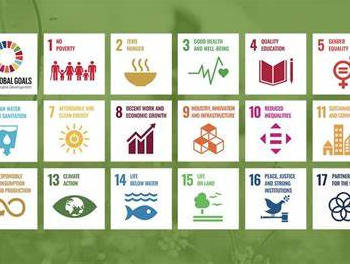|
|
Sustainability plays an increasingly important role in our lives. From recycling and fashion and dietary choices to where we work and how we do business – sustainability is becoming an integral part of everything we do.
A sustainable or green business refers to a company that has adopted certain practices and processes within its operations that incorporate environmental sustainability principles.
This typically involves taking steps to reduce its environmental footprint while at the same time increasing efficiency and profitability.
To achieve a sustainable business model, it is crucial to consider all aspects of operations, from production methods to customer service. Below, we take a closer look at what it means for a business to be sustainable.
Key Takeaways
- A sustainable business is a company that incorporates environmental sustainability principles into its operations while increasing efficiency and profitability.
- Sustainable businesses consider the environment, society, and economics as interconnected elements and strive to reduce their negative impact on the planet without compromising social sustainability or human rights for economic gain.
- Strategies for achieving a sustainable business model include implementing energy efficiency measures, utilizing renewable energy sources, minimizing waste, purchasing sustainable materials, adopting ethical codes of conduct, investing in research and development, and ensuring transparent financial governance.
- Adopting a sustainable business model offers benefits such as reduced costs, improved reputation, increased employee engagement, competitive edge, long-term success, compliance, and risk mitigation.
- Businesses can benefit from developing a tailored overarching strategy, identifying areas of operations that would benefit most from improved environmental performance, setting SMART goals, utilizing available resources, assessing potential risks, communicating changes clearly, monitoring progress regularly, and celebrating successes.
A Sustainable Business – a Definition

Sustainable businesses regard the environment, society, and economics as interconnected elements of their operations. They strive to reduce their environmental impact while ensuring that current needs are met without compromising future generations’ ability to meet theirs.
Sustainable businesses have a long-term focus when making decisions about processes, products, and services.
Their overarching goal is to create an economically viable operation that minimizes its negative effect on the planet and does not compromise social sustainability or human rights for economic gain.
Businesses must consider all aspects of their operations to build a truly sustainable model. This typically involves efforts such as reducing energy and water use, minimizing waste production, and finding alternatives to hazardous materials.
Furthermore, sustainable businesses should also strive to improve social sustainability by respecting human rights in their supply chain and offering fair wages and safe working conditions.
Furthermore, they should be socially responsible across all areas of the operation – from being mindful of advertising campaigns to actively engaging with local communities.
Finally, the company must ensure that its financial activities are managed responsibly for long-term success without compromising other aspects of sustainability.
How to Achieve a Sustainable Business Model
To achieve sustainability, small and large businesses alike must take steps towards an integrated approach that considers all aspects of their operations. Some common strategies include:
- Implementing energy efficiency measures in production and buildings;
- Utilizing renewable energy sources wherever possible;
- Minimizing waste through reuse and recycling practices;
- Purchasing sustainable materials for use in production processes;
- Incorporating environmental considerations into the decision-making process when formulating business strategy;
- Engaging with local communities to promote social responsibility initiatives;
- Adopting ethical codes of conduct for employees, suppliers, and customers;
- Investing in research and development to find new solutions for sustainability;
- Ensuring transparent and responsible financial governance.

Tips for Adopting a Sustainable Business Model
Though sustainability benefits businesses, figuring out where and how to start can be overwhelming. Here are some key considerations when making the transition:
- Develop an overarching strategy tailored to the company’s specific needs and objectives.
- Identify which areas of operations would benefit most from improved environmental performance.
- Create SMART goals that align with your overall sustainability strategy.
- Utilise available resources – such as existing software tools or services – to achieve sustainable business practices.
- Assess potential risks associated with adopting new processes or technologies – both financial and reputational risks should be considered here.
- Communicate changes clearly across all departments, ensuring everyone understands their role in implementing the new model and why it’s vital for the organization’s long-term success.
- Monitor progress regularly, and tweak plans to ensure sustainability goals are met.
- Celebrate successes – big or small – with the team to promote an ongoing culture of sustainability within the organization.
Why Is It Worth Implementing a Sustainable Business Model?
As more and more consumers become aware of the importance of sustainability, businesses have been increasingly adopting sustainable business models to stay competitive.
Sustainability offers many long-term benefits for companies, such as:
- Reduced costs: Though they often require an initial investment, sustainable business models can generate significant long-term cost savings by implementing energy efficiency measures, reducing waste, and employing renewable energy sources.
- Improved reputation: Consumers are increasingly aware of the environmental and social impacts of their purchases (80% of them say that sustainability is important for them while making purchasing decisions).
As such, businesses that operate sustainably often enjoy improved public opinion and higher levels of trust from their customers.
- Increased employee engagement: Employees who feel they are working for an ethically responsible organization often report greater job satisfaction and commitment to the company’s mission.
This is particularly beneficial if your workforce comprises millennials or other value-driven generations. In fact, according to IBM Institute for Business Value, 71% of employees and job seekers say they would like to work for environmentally sustainable companies.
- Competitive edge: By incorporating sustainable business practices, companies can gain a competitive advantage by attracting customers who are looking for ethically responsible products and services.
- Long-Term Success: Sustainable businesses have the potential to outlast their non-sustainable counterparts due to their focus on long-term planning and reducing negative environmental impacts.
- Compliance: Many countries have enacted regulations and laws that require businesses to operate responsibly, so implementing sustainability measures now may be valuable for future expansion.
- Risk Mitigation: Sustainability measures can help to protect businesses from potential reputational and legal risks associated with non-sustainable operations.

The Bottom Line
Ultimately, sustainability is not just an ethical obligation – it’s also good business sense. By making your business more sustainable, you can benefit from improved public opinion, reduced costs, and increased profitability in the long run.
From energy efficiency and waste reduction to ethical codes of conduct, you can adopt a range of strategies to create a truly sustainable business model. Implementing these changes now will help ensure your continued success in the future.













No Comments